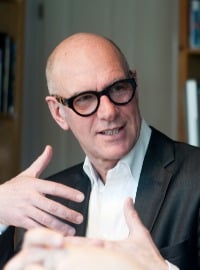


Dr. Aart Bontekoning
He started his professional career in the Dutch police force, first at street level, but later on in higher management. His growing interest in the process of change development led to studying Organizational Psychology at Utrecht University. In 1993 he started experimenting with generations as the ...
About Aart Bontekoning
He started his professional career in the Dutch police force, first at street level, but later on in higher management. His growing interest in the process of change development led to studying Organizational Psychology at Utrecht University. In 1993 he started experimenting with generations as the force for change within a culture. Somewhere around the year 2000 a more fundamental research project was started which, in 2007, earned him his doctorate degree. He is still the sole authority on generations in organizations.
Since then numerous organizations have called upon his expertise including banks, schools and universities, all levels of government, law-enforcement, hospitals and ICT companies.
His research into generations is ongoing and integrated with a wide range of workshops and masterclasses.
The Generation Theory?
In his PhD thesis research, Aart Bontekoning developed the generation theory. With this, he moves forward on the foundation layed by Karl Mannheim (1928), Ortega y Gasset and Julias Marías (1970), Jeffrey Pfeffer (1983), Strauss en Howe (1991) and Henk Becker (1992).
The essence of his generation theory:
Successive generations are, by nature, focused on evolutionary steps within the social framework. Be it leadership, cooperation, organizing, communicating, learning, information processing or conflict management. By working together, the different generations can use this evolutionary function to shape and update their own social bonds, either within an organization, union, political party or work field.
A generation is a group that is born within a certain time period and is linked together through:
1. A shared view on the vitality of the surrounding culture, followed by:
2. A shared response, which is given form by spontaneous impulses for renewal and:
3. A shared and collective mental, emotional and physical development which is honed on the evolutionary role of their generation.
A (new) generation gets energized by fulfilling it’s evolutionary role and loses energy when forced to adapt to the structures of previous generations which are instinctively and intuitively seen as inert. Every generation has within itself a group of frontrunners who make the largest impact. Without support of other generations, a single generation cannot fulfill its evolutionary task.

